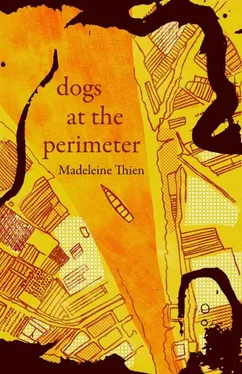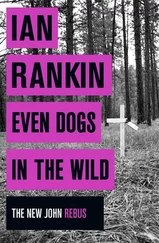“Where do you live?”
The older man shook his head. He stared at the waitress, who had her back to them, wiping down the machines.
“I’ll pay you back,” he said. “Believe me. I’m good for it. If I stay in St. John and find work … that’s tough at my age but I have skills, good skills. I wasn’t from Vancouver, was I? Nobody knew me, but you and I, we were friends. I sounded American, Californian, that’s what you said. Maybe San Francisco, you said. Some things stick. You were friendly to me, as if I were a whole person and not a zero. A waste.”
Hiroji didn’t know what to say. His memories of treating this man were tenuous, almost nothing.
“Wait here a moment,” he said at last as the man continued to gaze at him. “Don’t go anywhere, please.”
The man smiled down at his lap. “Oh, I’m in no hurry.”
Hiroji went across the road to a bank machine and he withdrew six hundred dollars. The cash went into a deposit envelope, which he sealed, with difficulty, and then he ran, slipping, across the pavement, between the pedestrians and their shopping bags and groceries. He fell on the ice, but through his coat he felt no pain. At the café, he gave the envelope to the man, who accepted it solemnly. Then Hiroji paid the waitress, tipping her generously. He hailed a taxi for James or Johnny or California, and he gave the driver money too. All he had was money. “Don’t worry,” the man said, holding Hiroji’s business card between his fingers. “I’ll return the favour. Wait a few days.”
“No,” Hiroji said. “It’s fine.”
The wheels of the taxi spun on the snow, then the car pulled away.
“I started walking,” Hiroji told me. All the way, he kept replaying the encounter in his head, the way this man, this patient, had counted his words out, like his brother used to do when he was drinking, as if he meant to spend the sentences wisely. He thought that his brother must be alive somewhere. He could be wandering, just wandering. He remembered, now, how the patient — Johnny, James — had been persuaded to come down from the railing of the Pattullo Bridge. He had been thirty-five years old at the time, older maybe. Someone had whacked him hard at the back of the head, so violently that his brain had crushed up against the front part of his skull. They had not been able to help him. Someone had joked, carelessly, that the two young men, Hiroji Matsui and Johnny Doe, the two Japs, looked like brothers. It had not been funny and nobody had laughed.
We were sitting at his kitchen table. Hiroji had opened a bottle of champagne and now he drank it like tap water. “I still remember the name of the doctor who made that joke,” he said, his voice shaking. “He’s dead now, but I still remember. I remember.”
He put his glass on the coffee table, went to the sideboard, and returned with a file. Inside were letters he had received from James, sent from Cambodia. The airmail paper was decades old, the sheets dry and ready to crumble, the Red Cross insignia faded. “I went there, to the border,” Hiroji said. His voice was insistent, upset. “I went to Aranyaprathet, to the refugee camps, to Sa Kaeo, I lived in Aran, I took care of a boy, Nuong. I loved Nuong like my own son but even he was lost. I came back without him. My mother asked me, ‘Where is your brother? Where is Ichiro?’ I told her, ‘We have to wait.’ ‘Wait for what?’ she asked. There was nothing I could say.”
I remembered Phnom Penh the day I walked out of it, the day the war ended. I saw the assault rifle against my father’s stomach, the way the barrel pushed him viciously against the wall.
“When my mother died,” he said, “I stopped looking. I wanted to be free of him.”
I told Hiroji, “You did everything possible.”
His hair, normally so immaculately in place, had fallen forward over his eyes. “I’m old now. I foolishly think that he … I dream about him. Do you find that strange?”
“No.”
Hiroji swayed slowly to his feet. He looked around the room as if he didn’t know where to go, to the couch or to the window, or even farther. Behind him, the blinking Christmas lights, up since December, dabbed the walls with colour, rhythmic and persistent.
I said, as gently as I could, “It wasn’t possible to save your brother. It wasn’t possible to save many people.”
For a moment my eyes watered. His expression changed, guilt-stricken now. Ashamed. I wanted so much to help him, to make him understand that there was nothing we could do. We had to let go. “I only mean that it’s difficult to find one person. It’s difficult. For you, for me, for anyone.”
“Forgive me, Janie. It’s my foolishness, nothing more.”
“No. Don’t say that.”
We fell into silence. He went to the table, took the champagne bottle, and refilled my glass. It frothed over the lip and ran between my fingers.
“Hiroji,” I said. “Listen. If you could have seen Phnom Penh that day. Or afterwards. If you knew what it was like.” I remembered my brother, his thin shoulders. To end up in one of the Khmer Rouge prisons meant that a person would die alone, in torment that was unimaginable. You had to hope that a brother, a father, died before reaching that point. You had to hope for the best.
“I know, Janie,” he said. He stood up unsteadily, lifting his plate.
“Wait,” I said.
“I’m not myself. I wasn’t thinking.”
I got up to help him but he said no, he asked me to sit for a moment. He went into the kitchen. I could hear Hiroji scraping the plates off, setting them in the sink. The file remained on the table. I slid it toward me. In the kitchen, the water ran thinly. Alone in the dining room, I began to sift cautiously through the pages. They were translations of Khmer documents, correspondence with various government officials, maps. Pages and pages of requests for information.
“Right,” Hiroji said when he came back into the room. “Don’t ever let me host a party again.” He smiled at me, reached out, rested his fingertips against my shoulder for a moment. He saw the pages spread across the table and, embarrassed, began to gather them up.
I stilled his hands. “Let me.”
I put everything, the maps, the letters, back into the file. It was full. Hiroji had been seeking information for years, but despite his efforts he had never found any trace of his brother. He began speaking about the Documentation Centre of Cambodia, DC–Cam he called it, an institution that was collecting documents related to the Khmer Rouge.
“Do you mind if I take these?” I said. “I could call them. It might be easier for someone who speaks the language, who knows the country.” I knew that searching was futile, that James was gone. He was one of the many, one of the two million dead. Still, I thought that if I did my best, if I came back empty-handed, it might bring Hiroji some release.
He looked at me, surprised. Grateful. Together, we went to the door and I proceeded to wrap the layers around me, coat, scarf, hat, gloves. Bundled up this way, I leaned forward to kiss him.
“Thank you for the gift, Janie,” he said. “It is a wonderful gift.”
On the sidewalk, I turned back once. He was still watching me, I could see the narrow doorway and the frail silhouette that he cast.
That week, I contacted DC–Cam and was put in touch with a researcher named Tavy. She had been working for the centre since it opened nearly a decade ago, cataloguing prison records, photographs, biographical information, and witness statements, documents that might be used in the upcoming War Crimes Tribunal. But, primarily, she told me, her job was to help Cambodians trace their missing family members. On the telephone, I struggled with words that should have come easily, but Tavy was patient. She said she would try to find James Matsui in the meticulous records of the Khmer Rouge. As the months went by, we spoke intermittently. There was never any new information. “Is there something more?” she asked me once. “I feel that there’s something more you wish to ask me.” I couldn’t answer at first, and then, finally, I told her, “No, nothing.” She said, “I understand.” By then, I knew, clearly, that the search for James would lead nowhere. I stopped by Hiroji’s apartment and tried to return the file. It was August. He asked me to hold on to it for a little while longer.
Читать дальше












